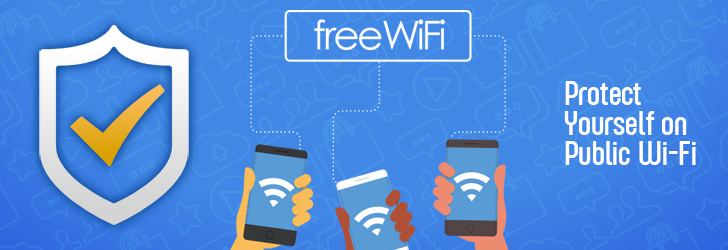
Public Wi-Fi is a lifesaver if you're trying to save on data usage or you need the Internet access, but sometimes the consequences of using public Wi-Fi can outweigh its convenience. Whether you're in a coffee shop, public library, university or an airport, all free Wi-Fi hotspots are equally susceptible to hackers and other data thieves. To mitigate these risks, users must take preventative measures to ensure that they are using public Wi-Fi safely.
The Dangers of Using Public Wi-Fi
There's a reason why public Wi-Fi is so dangerous, it's public. That means anyone on the same network with malicious intent can access and steal your private information with ease.
On a public Wi-Fi network, a hacker can scan for a list of the IP addresses connected and take their pick of which one they'd like to access.
Man-in-the-middle (MITM) Attack
One of the most common dangers on public WiFi is a man-in-the-middle attack. This describes the process in which a hacker can intercept the data that is traveling between two points in the network. The hacker can then read whatever information this transmitted data holds, making your connection no longer safe.
Rogue Wi-Fi Networks
This popular tool used by hackers allows a hacker to set up an access point. Often, this hotspot will look genuine to the victim and will likely have a very similar name to a trusted network you'd like to use. Typically, these networks lure users by using words such as "free". When someone connects to this network, they are unknowingly allowing the hacker to access all their information transmitted over the network.
Evil Twin Attack
Similar to a rogue Wi-Fi network, an evil twin attack enables a hacker to position themselves near public Wi-Fi users and create a new access point using the same name and frequency as the good twin. To any unsuspecting user, the evil twin will appear more tempting as it is likely to have a stronger Wi-Fi signal due to the close proximity of the hacker. Once connected, the hacker gains full access to your information and is able to see your every click and keystroke.
Malware
Using public Wi-Fi, hackers can also install malware to any unsuspecting user by finding flaws in the network. These flaws make the network vulnerable, essentially leaving a hole in the program where the hacker can insert code and specifically target and inject malware onto your device. Once infected, personal, financial and sensitive information can be accessed and used however the infiltrator desires.
How to Protect Yourself
Protecting yourself on a public Wi-Fi network can be relatively easy if you take the correct steps. Here are a few tips you should keep in mind to ensure your data is safe.
Maintain Good Internet Hygiene
The most obvious thing to do is to avoid doing anything sensitive or classified while connected to a public network. Whether you're using social media, online shopping or even just chatting with friends, login details, financial information, and private messages are all equally at risk.
Use HTTPS
Using websites that have HTTPS at the beginning of the URL (at the top of your browser) is a simple way to ensure the website you are using encrypts your data. This capital "S" along with the small lock symbol indicates that the website you are using is secure. However, these sites are still vulnerable to attacks, so you'll likely need an extra layer of security to keep your data protected.
Use Anti-Malware
Anti-malware is designed to protect your device (even mobile) against malicious malware on your device. Anti-malware scans through incoming traffic and warns you against clicking malicious links. The software acts as a virus cleaner or virus remover and is essential when using public Wi-Fi to keep your device protected from an attack.
Encryption
By encrypting your connection, the information being sent is scrambled as a kind of "secret code". If intercepted, it is completely unreadable by the hacker. Since most public networks are un-encrypted, meaning your data is completely readable in plain text, you'll need a VPN to encrypt your private details.
Use a VPN
The most effective way to protect yourself on a public network is to hide your IP address using a Virtual Private Network (VPN). A VPN places your actual IP address with an anonymous IP, often originating from somewhere else in the world. The VPN also provides strong encryption, meaning the hacker will be unable to intercept, read or find your private data being sent over the network.
Although public Wi-Fi networks are convenient for sending quick emails, make purchases, or searching something online, these hotspots are also convenient for hackers who want to steal your information for personal and financial gain. As a result, it is essential that individuals secure their device when using public Wi-Fi hotspots.
Share this post
Leave a comment
All comments are moderated. Spammy and bot submitted comments are deleted. Please submit the comments that are helpful to others, and we'll approve your comments. A comment that includes outbound link will only be approved if the content is relevant to the topic, and has some value to our readers.

Comments (0)
No comment